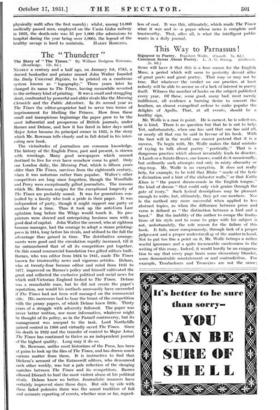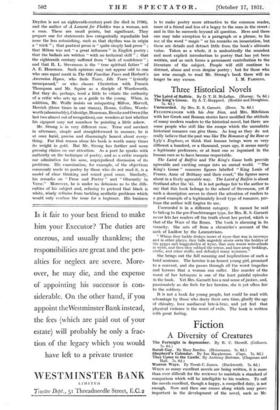This Way to Parnassus
2s. 6d.)
SOME will have it that this is a lean season for the English Muse, a period which will seem to posterity devoid alike of great poets and great poetry. That may or may not be true. But whatever the verdict on our practice, at least nobody will be able to accuse us of a lack of interest in poetry itself. Witness the number of books on the subject published every year. Of these; some good, many bad, most merely indifferent, all evidence a burning desire to convert the heathen, an almost evangelical ardour to make popular the delights of Apollo. That, at all events, should be a healthy sign.
Mr. Wolfe is a case in point. He is earnest, he is solicitous, he is kind. There is no question but that he is out to help. Yet, unfortunately, when one has said that one has said all, or nearly all that can be said in favour of his book. With the best will in the world one cannot pretend that it is a success. To begin with, Mr. Wolfe makes the fatal mistake of trying to talk about poetry " poetically." That is a dangerous practice which almost invariably leads to disaster. A Lamb or a Sainte-Beuve, one knows, could do it occasionally, but ordinarily such attempts end only in misty obscurity or clap-trap. Mr. Wolfe is no exception. It does not really help, for example, to be told that Blake " made of the lyric a divination and a hint of the alabaster walls," or that Kubla Khan is " the purest dream-music in the English tongue," the kind of dream " that could only visit genius through the gate of ivory." Such lyrical descriptions may be pleasant enough to write, but, ultimately, they get one nowhere. Nor is the method any more successful when applied to less abstract topics, as when the difference between prose and verse is defined as " the distinction between a bird and a beast." But the inability of the author to escape the limita- tions of his style and to come to grips with his subject is not, unfortunately, the sole reason for the failure of this book. It fails, more conspicuously, through lack of a proper judgement and a proper understanding of the matter in hand. Not to put too fine a point on it, Mr. Wolfe betrays a rather woeful ignorance and a quite inexcusable carelessness in the writing of this essay. Indeed, it would hardly be an exaggera- tion to say that every page bears some elementary blunder, some demonstrable misstatement or naïf contradiction. For example, Troubadours and Trouveres are not the same ;
Dryden is not an eighteenth-century poet (he died in 1700), and the author of A Lament for Flodden was a woman, not a man. These are small points, but significant. They prepare one for statements less categorically repudiable but none the less astonishing, such as that rhythm was in origin a " trick " ; that poetical prose is " quite simply bad prose " ; that Milton was not " a great influence " in English poetry ; that the ballads are written " with no technical skill " ; that the eighteenth century suffered from " lack of confidence " ; and that R. L. Stevenson is the " true spiritual father " of A. E. Housman. Such opinions may not appear odd to one who sees equal merit in The Old Familiar Faces and Herbert's Ascension Hymn, who finds Tears, Idle Tears " lyrically unsurpassed," or who classes Chesterton with Francis Thompson and Mr. Squire as a disciple of Wordsworth. But they do, perhaps, tend a little to vitiate the authority of a critic who sets up as a guide to the young. When, in addition, Mr. Wolfe insists on misquoting Milton, Marvell, Herrick (three times in one stanza), Donne, Collins, Words- worth (abominably), Coleridge, Housman, Brooke and Owen (the last two almost out of recognition), one wonders at last whether his signpost may not somehow be pointing a little askew.
Mr. Strong is in very different case. Terse and succinct in utterance, simple and straightforward in manner, he is at once lucid, precise and disarmingly honest about every- thing. For that reason alone his book is worth many times its weight in gold. But Mr. Strong has further and more pressing claims on our attention. As a poet he speaks with authority on the technique of poetry, and as a critic compels our admiration for his sane, unprejudiced discussion of its problems. His examination, for example, of the objections commonly made to poetry by those who do not read it, is a model of clear thinking and sound good sense. Similarly, his remarks on " Prose and Poetry " and " Obscurity in Verse." Moreover, he is under no delusions as to the diffi- culties of his subject and, refusing to pretend that black is white, wisely refrains from tackling aesthetic problems which would only confuse the issue for a beginner. His business
is to make poetry more attractive to the common reader, more of a friend and less of a bogey to the man in the street : and in this he succeeds beyond all question. Here and there one, may take exception to a paragraph or a phrase, to his use of the word " magic " or his remarks on incantation, but these are details and detract little from the book's ultimate value. Taken as a whole, it is undoubtedly the soundest and most explicit introduction to poetry that has yet been written, and as such forms a permanent contribution to the literature of the subject. People will still continue to distrust, abuse and even despise poetry ; but for those who are wise enough to read Mr. Strong's book there will no







































 Previous page
Previous page